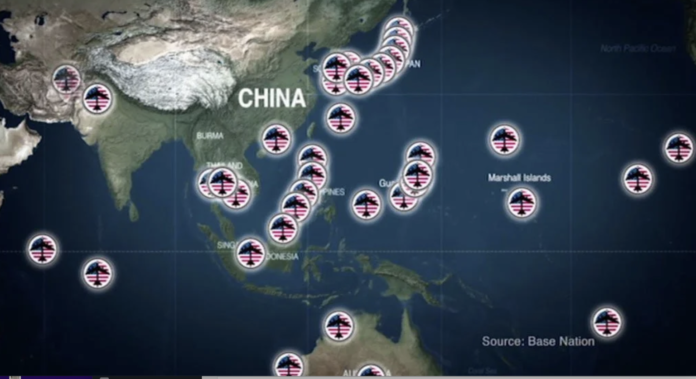A simple explanation of this week’s military and political developments in the Pacific
Australia, Japan and the United States exercise air power in Micronesia
Australia, Japan and the United States recently completed Exercise Cope North in Micronesia. Exercise Cope North has been conducted since the late-70s and this year’s exercise focus is an indicator of the Pacific’s increasing competition. This year the Australian, Japanese and American participants focussed on practising deploying to and supporting the air operations for large operational deployments to the vast expanses of Micronesia.
Operations in Micronesia are difficult because of the distances involved and sparsity of land. The exercise provided an opportunity to practice large scale operations in the area for humanitarian or military reasons. Not just for air crews to practice their skills and working together with allies; but also for planners and logisticians to practice supporting large deployments in this region.
Anybody that has read the history of the Pacific War will understand the significance of controlling Micronesia. Its islands provide bases for naval and air operations heading either West towards Japan as the United States did in the Pacific War; or east and south into the wider Pacific. In the modern world islands in Micronesia could also be used as bases for long range missiles dominating vast areas of the North West Pacific. Hence, why America retains bases in the area and is supporting a tri-lateral alliance with Japan and Australia.
Solomon Islands Pacific Games spending under scrutiny
Stable governance is a key component of international peace and stability. Unfortunately, some nations within the Pacific region do not have a good history of stable government. And; last week concerns were raised by the International Monetary Fund (IMF) about Solomon Island’s management of the Pacific Games, being hosted there later this year, and about the delayed general election.
IMF review team leader, Masafumi Yabara highlighted that an increase in national debt could result from the games and urged caution be exercised to minimise expenditure related to both the games and the general election.
In a small economy, events like the Pacific Games can be extremely taxing and cracks in governance start to show. The Solomon Island’s is receiving support from China, with the China Civil Engineering Construction Corporation building the main stadium and Jiang Su Provincial Construction Group Corporation renovating Solomons University’s dormitory building that will house athletes. Further, Chinese police met with Royal Solomons Island Police in January to provide advice about security issues.
Any financial concerns created by the costs of hosting the Pacific Games could provide more opportunities for China to increase its influence in the Solomon Islands, an area of intense strategic interest to Australia. Henderson Field on Guadalcanal, is a rare area of flat ground in Melanesia, suitable for large airfields and the reason many Japanese and American soldiers died fighting there during World War Two. Guadalcanal is a location from which a modern military equipped with long-range precision guided missiles can dominate the Coral Sea, a region vital to Australia’s maritime interests. Therefore, expect increasing competition between Australia and China in Solomon Islands.
Big Australian air show, includes new armed drone and says no to Chinese and Russian observers
The Australian International Air Show; or Avalon Air Show is the Australian aviation industry’s showcase, providing an opportunity to meet, network and view new technology in the aviation sector.
This year’s Avalon Air Show is marked by two interesting events; first it will display Australia’s new armed drone, the first produced in that country. The Strix drone is promoted as a very capable weapons system able to conduct reconnaissance and attack missions in high-risk environments.
The air show’s second point of interest is that Chinese and Russian observers are banned. This essentially symbolic act demonstrates a hardening of attitudes between Australia and these nations.
Detailed information about the Strix drone is obviously hard to find, but open-source information indicates that it will carry a payload of more than 100kg. It is likely to be armed with the Hellfire guided missile already used by Australia; and famous around the world as the key weapons system mounted on American drones during the War on Terror. It weighs about 45kg and is proven to be very effective with variants designed for a range of roles including the AGM-114R9X version designed specifically to target an individual.
Development of a drone by Australia is not surprising but it will be interesting to watch the weapons system develop because this tells us about Australia’s appreciation of its next war. My initial thoughts are the Strix drone will be designed for long-range operations over water, providing a reconnaissance and close air-support capability either for:
- Operations within an enemy Weapons Effect Zone (WEZ); the area in which precision-guided long-range missiles can prevent large vessels or land forces operating. It is likely designed to support widely dispersed ground and naval forces or to destroy the enemy’s key targeting assets because maintaining an effective WEZ requires excellent surveillance to find targets.
- Supporting low-level operations against hybrid forces, including surveillance and precision-targeting.
Media freedom in the Pacific
Small Pacific nations continue to try compromising media freedoms. In Papau New Guinea, the ‘Draft Media Development Policy’ a document that outlines a range of measures designed “to outline the objectives and strategies for the use of media as a tool for development” a nice bit of Orwellian double speak that many free speech advocates argue really means “publishing information the government doesn’t like is detrimental to development of the country, therefore will be stopped”.
These fears are compounded by the very short consultation period of two weeks, that was extended to three weeks after protests.
Free speech is a cornerstone of any well-governed democratic nation and this activity is eerily similar to precedent set in Fiji by the ‘Fiji Media Act’. The effect of which has been to stifle opposition voices in the media because it is ambiguously worded and includes harsh penalties. Creating an environment of uncertainty and risk that disincentivises criticism of government by media.
Governments that can’t be criticised by the media are less likely to be well-governed increasing the risk of nepotism, despotism and other forms corruption that undermine governance.
Japan / New Zealand intelligence relationship
New Zealand and Japan’s Foreign Ministers recently met in Tokyo; and as well as climate change and supporting Pacific Island nations discussion also included subjects of a more martial nature. Specifically, speeding up arrangements for sharing intelligence.
A couple of weeks ago in this column we discussed Japan’s massive increase in defence spending and its change in defence policy towards forward defence; or in political double speak ‘counter strike’. Essentially, Japan is buying weapons like Tomahawk cruise missiles that will allow it to create a Weapons Effect Zone and close the East China sea to Chinese warships using a long-range and very accurate missile system. Japan is also developing the capability to deploy and support amphibious forces; either to protect the home islands or possibly to deploy elsewhere in the Pacific allowing a defensive war to be fought at a distance.
However, precision weapons like Tomahawk require excellent intelligence, and the most powerful intelligence network in the world is the American led ‘Five Eyes.’ A network that New Zealand has strong connections with, forged through World War Two, the Cold War, years of peace-keeping and during the War on Terror. By building an improved intelligence relationship with New Zealand, Japan is aims to build its links with more powerful members of the ‘Five Eyes’ intelligence community.
Ben Morgan is a bored Gen Xer and TDBs military blogger





Under ‘Small Pacific nations continue to try compromising media freedoms’, you forgot to mention New Zealand.
NZ doesn’t count, on many levels including anything meaningful. It’s a parasitic country at the bottom of the world on the way to nowhere and it has a lot of sheep and cows.
“Australia, Japan and the United States recently completed Exercise Cope North in Micronesia. Exercise Cope North has been conducted since the late-70s and this year’s exercise focus is an indicator of the Pacific’s increasing competition…..” Ben Morgan
“This year’s Avalon Air Show is marked by two interesting events; first it will display Australia’s new armed drone,….” Ben Morgan Pacific Intelligence Update March 7
“The air show’s second point of interest is that Chinese and Russian observers are banned. This essentially symbolic act demonstrates a hardening of attitudes between Australia and these nations….” Ben Morgan Pacific Intelligence Update March 7
To me the points of interest are not the horrid demonstration of killer drone technology, or the barring of Russia and China.
The points of interest for me is that New Zealand forces were excluded from the Cape North military exercise in Micronesia.
This is a good thing.
The other point of interest to me is Ben Morgan’s back handed recognition that the struggle for imperialist domination and control in the South Pacific is not just a Russian and Chinese one sided thing.
Western imperialism’s penetration, oppression, interference and domination in the South Pacific is long and sordid as any other.
“….. China’s larger plan is to develop support for future competition with the United States and its allies, specifically in the ‘Global South’.” Ben Morgan Pacific Intelligence Update 28th February
“….often in the Pacific, nations see themselves as unimportant or not of interest to the larger powers. Unfortunately, this is not true. Intelligence operations often start at less well guarded fringes and work inwards.” Ben Morgan Pacific Intelligence Update 28th February”
“….Both Australia and New Zealand retain exceptionally close intelligence relationships with the United States, the United Kingdom and with NATO allies.” Ben Morgan Pacific Intelligence Update 28th February
The ideal would be as well as New Zealand no longer being included in the military exercises of the Western imperialist bloc but also if New Zealand dropped out of the 5 eyes spy network as well. It never served our interest, and was always about serving Western imperialism.
Only then could New Zealand could stand before the world as a truly neutral arbiter of global peace and security, (especially in this part of the world). Standing outside the Western imperialist bloc would also have the advantage of us not being drawn into Western imperialist wars of choice like Iraq or Afghanistan.
But if we weren’t part of the Five Eyes, we couldn’t access Important Intelligence Information that tells us really important things like that the US considers Julian Assange to be a terrorist for exposing war crimes. Think of the risk to National Security if dangerous terrorists like Assange could freely travel to New Zealand.
Its Muslim terrorists who are the problem.
And there you have it in a nutshell. 5 Eyes threat assessment blindness – Muslims are ‘the problem’ – white anti Muslim extremists like Brenton Tarrant are not.
5 Eyes does not serve New Zealand’s interest.
Seems Ben’s onto a really good idea. Let’s antagonise our largest trade partner in favour of people who make it hard to trade fairly with. Lets kill our own economy by driving into a war which will kill our imports, our exports, our people. Wow Ben, great idea.
Comments are closed.